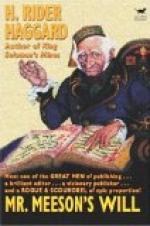Then Fiddlestick, Q.C., rose to cross-examine, devoting his efforts to trying to make Eustace admit that his behaviour had been of a nature to amply justify his uncle’s behaviour. But there was not very much to be made out of it. Eustace detailed all that had passed freely enough, and it simply amounted to the fact that there had been angry words between the two as regards the treatment that Augusta had met with at the hands of the firm. In short, Fiddlestick could not do anything with him, and, after ten minutes of it, sat down without having advanced the case to any appreciable extent. Then several of the other counsel asked a question or two apiece, after which Eustace was told to stand down, and Lady Holmhurst was called. Lady Holmhurst’s evidence was very short, merely amounting to the fact that she had seen Augusta’s shoulders on board the Kangaroo, and that there was not then a sign of tattoo marks upon them, and when she saw them again in London they were tattooed. No attempt was made to cross-examine her, and on the termination of her evidence, the Court adjourned for lunch. When it reassembled James Short called Augusta, and a murmur of expectation arose from the densely crowded audience, as—feeling very sick at heart, and looking more beautiful than ever—she stepped towards the box.
As she did so the Attorney-General rose.
“I must object, my Lord,” he said, “on behalf of the defendants, to this witness being allowed to enter the box.”
“Upon what grounds, Mr. Attorney?” said his Lordship.
“Upon the ground that her mouth is, ipso facto, closed. If we are to believe the plaintiff’s story, this young lady is herself the will of Jonathan Meeson, and, being so, is certainly, I submit, not competent to give evidence. There is no precedent for a document giving evidence, and I presume that the witness must be looked upon as a document.”
“But, Mr. Attorney,” said the Judge, “a document is evidence, and evidence of the best sort.”
“Undoubtedly, my Lord; and we have no objection to the document being exhibited for the court to draw its own conclusion from, but we deny that it is entitled to speak in its own explanation. A document is a thing which speaks by its written characters. It cannot take to itself a tongue, and speak by word of mouth also; and, in support of this, I may call your Lordship’s attention to the general principles of law governing the interpretation of written documents.”
“I am quite aware of those principles, Mr. Attorney, and I cannot see that they touch this question.”
“As your Lordship pleases. Then I will fall back upon my main contention, that Miss Smithers is, for the purposes of this case, a document and nothing but a document, and has no more right to open her mouth in support of the plaintiff’s case, than would any paper will, if it could be miraculously endowed with speech.”
“Well,” said the Judge, “it certainly strikes me as a novel point. What have you to say to it, Mr. Short?”




